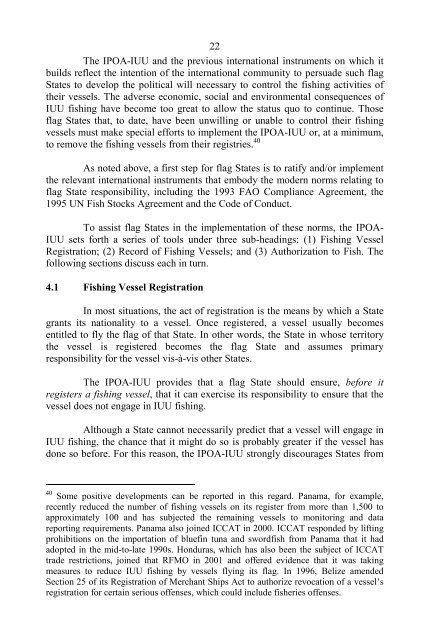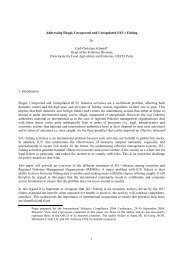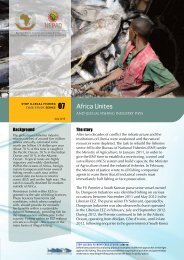Implementation of IPOA/IUU - International MCS Network
Implementation of IPOA/IUU - International MCS Network
Implementation of IPOA/IUU - International MCS Network
Create successful ePaper yourself
Turn your PDF publications into a flip-book with our unique Google optimized e-Paper software.
22The <strong>IPOA</strong>-<strong>IUU</strong> and the previous international instruments on which itbuilds reflect the intention <strong>of</strong> the international community to persuade such flagStates to develop the political will necessary to control the fishing activities <strong>of</strong>their vessels. The adverse economic, social and environmental consequences <strong>of</strong><strong>IUU</strong> fishing have become too great to allow the status quo to continue. Thoseflag States that, to date, have been unwilling or unable to control their fishingvessels must make special efforts to implement the <strong>IPOA</strong>-<strong>IUU</strong> or, at a minimum,to remove the fishing vessels from their registries. 40As noted above, a first step for flag States is to ratify and/or implementthe relevant international instruments that embody the modern norms relating t<strong>of</strong>lag State responsibility, including the 1993 FAO Compliance Agreement, the1995 UN Fish Stocks Agreement and the Code <strong>of</strong> Conduct.To assist flag States in the implementation <strong>of</strong> these norms, the <strong>IPOA</strong>-<strong>IUU</strong> sets forth a series <strong>of</strong> tools under three sub-headings: (1) Fishing VesselRegistration; (2) Record <strong>of</strong> Fishing Vessels; and (3) Authorization to Fish. Thefollowing sections discuss each in turn.4.1 Fishing Vessel RegistrationIn most situations, the act <strong>of</strong> registration is the means by which a Stategrants its nationality to a vessel. Once registered, a vessel usually becomesentitled to fly the flag <strong>of</strong> that State. In other words, the State in whose territorythe vessel is registered becomes the flag State and assumes primaryresponsibility for the vessel vis-à-vis other States.The <strong>IPOA</strong>-<strong>IUU</strong> provides that a flag State should ensure, before itregisters a fishing vessel, that it can exercise its responsibility to ensure that thevessel does not engage in <strong>IUU</strong> fishing.Although a State cannot necessarily predict that a vessel will engage in<strong>IUU</strong> fishing, the chance that it might do so is probably greater if the vessel hasdone so before. For this reason, the <strong>IPOA</strong>-<strong>IUU</strong> strongly discourages States from40 Some positive developments can be reported in this regard. Panama, for example,recently reduced the number <strong>of</strong> fishing vessels on its register from more than 1,500 toapproximately 100 and has subjected the remaining vessels to monitoring and datareporting requirements. Panama also joined ICCAT in 2000. ICCAT responded by liftingprohibitions on the importation <strong>of</strong> bluefin tuna and swordfish from Panama that it hadadopted in the mid-to-late 1990s. Honduras, which has also been the subject <strong>of</strong> ICCATtrade restrictions, joined that RFMO in 2001 and <strong>of</strong>fered evidence that it was takingmeasures to reduce <strong>IUU</strong> fishing by vessels flying its flag. In 1996, Belize amendedSection 25 <strong>of</strong> its Registration <strong>of</strong> Merchant Ships Act to authorize revocation <strong>of</strong> a vessel’sregistration for certain serious <strong>of</strong>fenses, which could include fisheries <strong>of</strong>fenses.
















